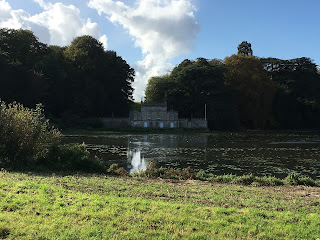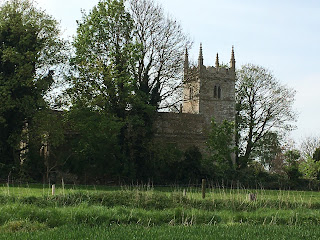COUNTRY HOUSE
 |
| Fort Henry: Exton estate |
‘He lives in a house, a
very big house in the country…’
(Albarn/Coxon/James/Rowntree)
A holiday over: warm and unseasonal weather, flaneurs on the pier watching the dots of Dutch and German bathers and sun-worshippers spread along Scheveningen beach (though the sand restaurants were mostly packed away for the winter). Here, back in Rutland, the slow, clever slip from summer to autumn, a cool northerly breeze under a brilliantly blue sky. And a couple of thousand miles away, unspeakable mayhem in a desecrated Holy Land, with the threat of far worse to come. It’s one of those occasions when the normality of a British Saturday morning seems grossly inappropriate. I write to our MP, the excellent Alicia Kearns, who chairs the Foreign Affairs Committee in the House of Commons, pleading for an even-handed response from the British government. After our pilgrimage visit in 1997, I said I thought we personally would never return to Israel again. It would take a miracle for that to change now. The Israeli government by its actions and its laissez-faire attitude to its ‘settlers’ has made the horrors of the Hamas attack more likely, though they will never admit it: successive regimes have shown what the Bible calls ‘hardness of heart’. Many of us have longed for a true ‘two-state solution’, a possibility that seems now utterly remote. Both sides wish to extinguish the other: the Old Testament re-lived. How can the cycle of violence be stopped? That is the major theme of ancient Greek tragedy, as puzzling today as it was two and a half millennia ago.
My
walk today takes me along the lanes from Empingham to Exton. Exton village is
intriguing. The church is detached, at the end of a long drive beside what was
presumably the former (very attractive) rectory and since none of the houses in
the contemporary village predate the eighteenth century, the supposition is
that the village was removed from the area south of the church. Perhaps the picturesquely named ‘Pudding Bag
Lane’ is the last vestige of that phase of Exton’s life. Notwithstanding, the
village green, the pub and the houses which surround it remain as an apparent
paradigm of what an English village should be, from a tourist’s point of view.
But it’s not as simple as that...
Among the issues on which the next election may be fought are housing and energy production. The latter affects rural communities in two ways – solar farms, and on-shore wind farms. I’m as wary as the next person about the grand urbanite schemes to trash a countryside not apparently always valued in terms of food security or amenity. But Exton is a salutary reminder of the complexities and impermanence of national need. The country between Exton and Cottesmore looked very different as recently as 1959, and here I quote a guide to Cottesmore village from that date (to be found on the current Cottesmore website):
‘The ironstone mining has very much altered the face of the country around Cottesmore in recent years. This opencast mining which surrounds the village on three sides, north, south and west has lowered the level of the fields by some ten to twenty feet, cut through the beautiful Exton woods, and swept away old field paths, springs and other natural landmarks…the road to Exton is threatened with closure…however this industrialisation of what was once a purely agricultural community has brought considerable prosperity to the village and many of the men and boys now work “at the pit”’.
The
same 1959 guide shows a railway system which ran right round the Exton lands I
walk today. The width and straightness of the gravel paths betrays their
origins, and even to the untrained eye, there are little scarps and ‘hills and
holes’ where the ironstone was extracted.
But today rurality has resumed, and some of the land has been successfully reclaimed through a golf club with its accompanying holiday village and hotel. The landscape around me is complicated because it also subsumes the eighteenth-century toffs’ playground of ‘Fort Henry’ where naval sea-battles were reconstructed in miniature for the pleasure of house-guests, and the ‘lost’ village of Horn, whose name survives only in the farm and mill.
When I worked with a media company, we used to smile cynically as clients drove into our car park in their Aston Martins or Bentleys. We tended to assume their conspicuous wealth was ill-gotten. This was often prejudiced and wrong, but sometimes sadly our suspicions proved correct, when those clients failed to pay their bills, or ended up in court. In whichever ways the Noel family of Exton acquired their money (and we’re becoming used to the fact that ‘old money’ was sometimes amassed at the expense of others’ misery), the income from the industrial exploitation of their land came in useful to more recent generations. And particularly during WW2, the iron provided by the East Midlands was vital for the war effort. What we now reflect on is therefore a tension, a competition of ‘goods’, somewhat analogous to the one we face today in terms of green energy production. We may yet save the planet, but damage its fabric in other, unforeseen ways.
Exton
church is an extraordinary treasure chest, particularly if the appreciation of
sculpture is your thing. Even little old Philistinic me can see the 1685
Grinling Gibbons’ black and white marble monument commemorating Baptist Noel is
a great artistic achievement. And there’s much more besides.
Grinling at Exton
Wood is my passion.
I live
to find the life
within its line.
Some demand marble
and graciously I accede
where they insist.
My design;
the labour devolved;
my name appended
to alien skills.
I’m used to cities:
Rotterdam, Rome,
London above all -
my latter home.
I owe a debt
to Deptford
where Evelyn found me,
sent me to Court
to please a King.
Fame thereafter
followed,
celebrity exceeding
talent.
‘Gibbons is good’
they said,
‘for religion
And honouring the dead
-
if you like togas.’
I was intrigued.
‘Exton’ read the note.
Where was that?
My God, how remote
it turned out to be.
But money talks,
and when I went
to see the thing
finished and in situ,
I was surprised.
The black and white,
revelatory,
unintended,
made me think
of birches I have seen
stark silhouettes on
an ebony winter sky.
But I would prefer
to be remembered
in oak
when comes my turn
to die.
A few days later, between the walk and this write-up, a Palestinian missile, as we presume, goes astray and hundreds sheltering in the courtyards of the al-Ahli hospital in Gaza are killed. Some mentions are made that this is a Baptist hospital, although the Southern Baptists who administered it withdrew in the 1980s. Since then, it has been run by the Episcopal Church out of Jerusalem. It seems, amid all the rhetoric, including P.M. Sunak declaring that he ‘wants (Israel) to win…’, that the Christian presence among the Palestinian people has become invisible to the British media and body politic.
Empingham – Exton –
Greetham – Horn – Empingham
19.5 km. 5.5 hours. Initially
cool weather under a bright blue sky with a chilly northerly wind. Cloudier
later with the briefest of showers. 12
deg C.






Comments
Post a Comment